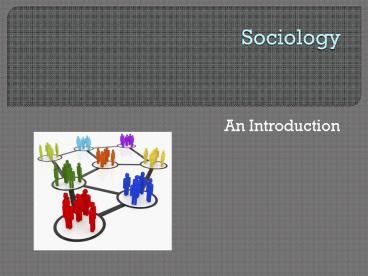Sociology - PowerPoint PPT Presentation
Title:
Sociology
Description:
Key terms- sociology, culture, socialization, social ... no religion Functionalism The central idea of this perspective is that society is made up of interrelated ... – PowerPoint PPT presentation
Number of Views:145
Avg rating:3.0/5.0
Title: Sociology
1
Sociology
- An Introduction
2
- Key terms- sociology, culture, socialization,
social structure, conflict perspective,
functionalist perspective, symbolic interaction
perspective.
3
What is sociology?
- Sociology is one of the seven social sciences-
history, anthropology, geography, economics,
psychology, archeology, political science - Sociology is the study of cultures, social
structure and their effects and influence on
behavior - Need to use sociological imagination to look
beyond the individual as the cause for success
and failure. - Need to see how society influences outcomes
- Look at suicide
4
Culture
- Culture is the knowledge, values, customs, and
physical values shared by a society - Family
- Marriage
- Issues such as race, gender and social control
5
Socialization
- Socialization is the cultural process of learning
to participate in life - What characteristics are influenced by nature
(heredity) or nurture (contact with others)?
6
Social Structure
- Social Structure defines limits on our behavior,
roles, social status, social institutions. - Location on the social structure influences
attitudes, perceptions and behavior - People are divided by social class and social
groups.
7
Sociological Perspectives
- Conflict Perspective- emphasis is on competition,
change and constraint within society - Focus on social classes and differences in
wealth, power and prestige - Upper classes control societys wealth and
resources and exploit lower classes - Once a group has power they want to keep it and
create advantages for themselves - Major conflict theorists- Karl Marx, W.E.B. Du
Bois, John Bellamy Foster - Criticisms
- Conflict is not always a bad thing, competition
can create excellence
8
Sociological Perspectives
- When people control try to enforce authority
those not in control will resist. The result is a
constant struggle over who has authority - Lewis Coser looked at people in close
relationships and described how these
relationships divide responsibility and
privileges. When the relationship changes
conflicts will occur
9
Sociological Perspectives
- Symbolic Interaction
- How communication influences our interactions
- Root of society is from symbols
- Symbols help develop our worldview
- Vary from culture to culture
10
- Symbolic interactionists see the self as a
symbol- it consists of the ideas and symbols of
who we are. - Symbols tell us
- Who we are related to and how to behave
- To tell time and how to coordinate our actions
with other people - Build buildings, make movies and music
- Without symbols no government, no hospitals, no
religion
11
(No Transcript)
12
Sociological Perspectives
- Functionalism
- The central idea of this perspective is that
society is made up of interrelated parts that
make up the whole. - Early sociologists saw society as a living
organism that, in order to function smoothly all
the parts had to work in harmony - Functionalists look at the structure of society-
how the parts fit together to make the whole - They also investigate the function- what each
part does and how it contributes to society - Criticisms
- Does not take into account wealth and power
- Thinks that social change occurs slowly
13
Functional Analysis
- Sociologist Robert Merton dismissed the organic
theory but kept the essence of functionalism-
society as a whole composed of parts working
together - He used the term function to describe the
beneficial aspects of society - Dysfunctions are consequences that harm society.
- Functions can either be manifest or latent
- Manifest functions are intended to help the
system - Latent functions are unintended consequences of
manifest functions - Latent dysfunctions are consequences that harm
the social system
14
Macro vs. Micro Perspectives
15
Other Sociological Perspectives
- Feminist Theory- How society is ordered around
gender inequality, oppression - Exchange theory- Experiences consist of rewards
and costs that lead to our choice of social
interaction - Environmental theory- how societies adjust as
resources and the environment change
16
Sociology vs. Common Sense
- All questions are true/false
- More U.S. students are shot in school today than
fifteen years ago. - The earnings of U.S. women have caught up with
men. - When faced with natural disasters such as floods
or earthquakes, people panic, and social
organization disintegrates
17
- 4. Most rapists are mentally ill.
- 5. Most people on welfare are lazy and looking
for a handout. They could work if they wanted to. - 6. Compared with women, men maintain more eye
contact in face to face conversations
18
- 7. Couples that live together before marriage are
more satisfied than couples that do not live
together before marriage. - 8. Most husbands that get laid off from work take
up the slack and increase the amount of work they
do around the house. - 9. Students in Japan are under such intense
pressure to do well in school their suicide rate
is double that of U.S. high school students.
19
Assignment
- Of the three theoretical perspectives, which one
do you think is the most effective in studying
sociology? Why? - You must answer both parts of the question to
receive full credit.

